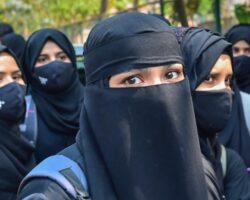The Supreme Court issued a split decision in the Karnataka hijab ban case

Karnataka hijab ban controversy: The BJP government’s executive order on February 5 sparked widespread protests.
On Thursday, the Supreme Court issued a split decision on a slew of petitions challenging the ban on wearing hijab, the headscarf worn by Muslim women and girls, in Karnataka educational institutes. The case was heard in the Supreme Court for ten days before the final order was reserved on September 22 by a bench of Justices Hemant Gupta and Sudhanshu Dhulia.
As the verdict was read out on Thursday, Justice Hemant Gupta affirmed the Karnataka High Court order from March, while Justice Sudhanshu Dhulia quashed the state government’s order on headscarves.
The case has been referred to Chief Justice of India UU Lalit for the formation of a larger bench.
During the previous hearings, one of the arguments raised was that Muslim girls might stop attending school due to the ban on wearing headscarves.
The Karnataka government, which announced the curbs, has insisted that the order is “religion neutral.” Massive protests have erupted in the southern state of Karnataka in response to the government order.
The controversy erupted after the Government PU College in Udupi was accused of prohibiting female students wearing hijabs from entering classrooms. The protests began in Udupi and spread to other parts of the state before capturing the attention of the entire country.
In March, the Karnataka High Court upheld the government’s February 5 executive order, stating that the wearing of hijab by Muslim women is not an essential religious practise in Islam. It was said to be the first ruling by a constitutional court in the country on whether hijab is an essential religious practise in Islam, entitled to protection under the Indian Constitution, subject to the least amount of state interference.
In its 129-page decision, the high court bench led by Chief Justice Ritu Raj Awasthi held that the Quran, Muslims’ holy book, does not require women to wear hijab and that the attire is “at best a means to gain access to public places” and a “measure of social security,” but “not a religious end in itself.” It had also advocated for a “rapid and effective” investigation into the stoking of the Karnataka hijab controversy, suspecting “unseen hands at work to engineer social unrest and disharmony in the state.”
